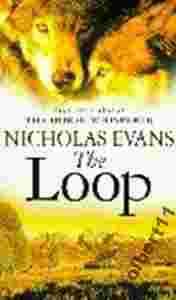The Loop opens as a pack of wolves makes a sudden return to the Rocky Mountains ranching town of Hope, Montana, where a century ago, they were slaughtered by the thousands. Now shielded by law as endangered species, they reawaken an ancient hatred that will tear a family and, ultimately, the town apart.
At the center of the storm is Helen Ross, a 29-year-old wolf biologist sent alone into this remote and hostile place to protect the wolves from those who seek to destroy them. The Loop charts her struggle and her dangerous love affair with the son of her most powerful opponent, the brutal and charismatic rancher Buck Calder.
At once a haunting exploration of man’s conflict with nature and the wild within himself and a sweeping story of deadly passions and redemptive love, The Loop is destined to capture the hearts and imaginations of readers everywhere.
Fans of Evans's bestselling debut, The Horse Whisperer, may find that this issue-oriented follow-up is a case of deja vu. Montana is again the setting, animals are crucial to the plot and a love story between dissimilar people is the heart-tugger. The bitter debate over the reintroduction of wolves into the American West provides the hook. After the book opens with the killing of a family dog by a stray wolf, the battle lines are quickly and clearly drawn. The wolf-hating cowboys are led by quintessential alpha male Buck Calder, the region's biggest rancher, bully and philanderer. Primary opposition comes from wolf biologist Helen Ross, a despised Easterner hired to keep the wolves safe from ranchers and more selective about their predation. She eventually teams up--professionally and romantically--with Calder's stuttering, insecure son Luke, much to his father's disgust. This underplayed romance is nicely done, as is the burgeoning revolt within the Calder household by Luke and Eleanor, Buck's surprisingly self-possessed wife. But Evans once again shows himself capable of graceless writing. As if preparing for the inevitable casting call, detailed character studies occupy large portions of the initial 100 pages, preempting later, subtler disclosures. His passages on wolf behavior read like mediocre nature film scripts. The novel is more a work of ideology than imagination. Among its overt messages: man is out of sync with nature; the New West is full of lonely, emotionally scarred people licking their wounds; and wolves make better alpha males than humans do. Literary Guild and Doubleday Book Club main selection; author tour. (Sept.)

